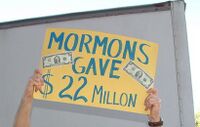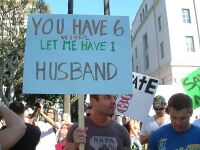
FAIR is a non-profit organization dedicated to providing well-documented answers to criticisms of the doctrine, practice, and history of The Church of Jesus Christ of Latter-day Saints.
| California Proposition 8: Questions and Myths |
The Church did not ask members how they would vote on the proposition. California ballots are cast by "secret ballot" in a manner that they can vote free from intimidation. As such, votes cast by Church members remain private unless they themselves chose to disclose this information. The Church does not apply discipline based upon a member’s voting record and has a long standing respect for the separation of civic responsibility and church participation.
The Church may apply discipline based upon other behavior by individual members. Such discipline, if any, is left to local leaders (bishops and stake presidents) who are more intimately acquainted with the behavior that may be in question. it is conceivable that strong feelings on the Church's position compelled certain members to individually take public stands against the Church or its leadership. Depending on the nature of behavior of the individual, some persons may have received admonition or other actions relative to their membership that would be considered "disciplinary" in nature. However, such actions would only be in reaction to the behavior of the individual and not in reaction to their personal feelings or their voting record. Elder L. Whitney Clayton was asked if "Latter-day Saints who publicly opposed Prop. 8 would be subject to some kind of church discipline," to which he responded, "those judgments are left up to local bishops and stake presidents and the particular circumstances involved." [1]
The Church as an institution made no direct monetary contributions to the "Yes on 8" campaign. All monetary donations came from individual Church members, who decided if and how much they would contribute.
The Church did, however, make two in-kind donations with the equivalent values of $2,078.97 (October 25, 2008) and $2,864.21 (November 1, 2008). The term "in-kind" represents donations that are made to the Church in some form other than cash (For example, the payment of tithing using stock constitutes a in-kind donation). In this case, the in-kind donations were to cover out-of-pocket expenses such as airfare and lodging that were incurred by several Church leaders who travelled to California in support of the proposition. The Church declared these donations, as required by law, and they are part of the public record.

From the Internal Revenue Service:
The church did not participate in or intervene in any of the political campaigns for any of the candidates running in the 2008 election. The IRS does, however, permit a Church to take positions on issues:
According to Barry Lynn, executive director of "Americans United for the Separation of Church and State" (and who, for the record, was "outraged by the Prop. 8 victory"):
Nonprofit 501c(3) organizations are prohibited from spending more than 20 percent of their budgets on political activities. "The 20 percent threshold means that the Catholic or Mormon churches, whose organizations span the globe, would have had to spend hundreds of millions of dollars—if not billions—to violate their tax-exempt status." [4]
Some companies that are owned by the Church, such as Bonneville Communications, are in business to make profit. These businesses pay their taxes just like any other business: They are not part of the tax-exempt portion of the Church.
There is no evidence that any Church owned for-profit companies made contributions to the Yes on 8 campaign or any supporting organization.
California members who chose to donate to the Prop 8 campaign were explicitly told that their donations would not be tax deductible. None of the funds donated to the campaign are allowed as deductions.
Church headquarters did not pass down individual contribution goals to members. In some cases local Church leaders may have asked members to contribute a specific amount. Some goals were suggested to the general membership by their Stake President, such as “one dollar per day.” Some Stakes provided wards with goals that they were expected to meet.
The question is not relevant, since the Church as an organization did not donate any money to “Yes on 8.”
Members contribute to humanitarian efforts sponsored by the church based on their specific abilities. For example, fast offerings are donations to a fund for assisting local and other members who are financially struggling. These funds represent a generous offering of the value of 2 meals abstained from on the first Sunday of each month. The combination of personal sacrifice (fasting) and financial sacrifice make such contributions particularly meaningful for both the donor and the recipient.
The Church also manages a significant humanitarian effort known as "LDS Humanitarian Services". This organization provides relief and assistance for disasters and other urgent humanitarian needs. The amount contributed by the Church to humanitarian causes far outweighs anything that individual members contributed toward the effort to pass Prop 8. According to a 2007 report from the Presiding Bishopric of the Church, external humanitarian efforts exceeded $1 billion in cash and material contributions from 1985 until 2007. This does not include contributions of many millions more as part of the Church Welfare program.
Other humanitarian efforts include:
Many Latter-day Saints make significant contributions to humanitarian efforts outside of LDS sponsored channels. For example, in 2007, high profile Latter-day Saints John and Karen Huntsman donated more than $672 million for charitable causes not associated with the LDS Church. Utah in general was ranked #2 of all 50 states in charitable contributions in 2007.
Church members have always been encouraged to contribute to humanitarian causes. Since all contributions came from individual members, those that donated made the choice to support the “Yes on 8” campaign.
It should be noted that the Latter-day saints believe that family is central to the plan of God for the eternal destiny of His children and has been instituted by divine design for the betterment of society. The First Presidency and Quorum of the 12 Apostles warned "that the disintegration of the family will bring upon individuals, communities, and nations the calamities foretold by ancient and modern prophets" (see the Proclamation). For these reasons, many Latter-day Saints and their leaders believe that Proposition 8, whose original title was "The California Marriage Protection Act" was a cause of great significance and worthy of their most noble efforts.

The same type of question was asked when, after supporting polygamy for years, the Church ceased its practice. The Church no longer practices polygamy, and should not be confused with splinter groups who continue the practice. Prop 8 protesters, however, do like to raise the issue of polygamy, and make no distinction between the LDS Church and splinter groups.
It is important to realize that 19th century Mormons who practiced plural marriage did not seek federal recognition of their marriages. They would have been pleased to simply be left alone, instead of being subject to spy networks, home invasion by federal marshals, loss of the right to vote simply for being members of the Church even if they were not polygamists, jail time, and threats of military occupation by the Congress.
Homosexuals in California with access to domestic partnership laws have far more legal protection and benefits for their cohabitation relationships than 19th century Mormons ever had. Homosexuals who choose to simply cohabitate are likewise unmolested by the state, unlike LDS polygamists of the 19th century.
LDS opposition to the use of the term "marriage" for same-sex unions derives, however, from a belief that homosexual behavior is wrong, contrary to the commandments of God, and something which believers should not support. Homosexuals are free to make their own choices about behavior, but Church members cannot in good conscience encourage that behavior by lending their voice to efforts which socially sanction it.
Critics of the Church have taken advantage of the Proposition 8 backlash to promote their agenda. The following section addresses some of these claims.
No evidence has been offered for this expansive claim. Throughout the history of the Church, some left the Church over new doctrines in Kirtland or Nauvoo, over strife in Missouri, over the initiation of polygamy, over the move West, over the repeal of polygamy, over the priesthood ban, over the repeal of the priesthood ban, over the Church's position on the ERA, and now over Proposition 8. The Church continues to survive and thrive.
Those that do seem to receive media attention for leaving the Church over this issue typically appear to be inactive members who left the Church "in spirit" long ago, but used this as an occasion to formalize their exit:
According to Church spokesman Michael Otterson, "All the reports we have received indicate that the vast majority of members solidly support the church position. A few may not, and that's their choice. But you could never describe it as a movement. You can only describe it as a ripple." [7]
Latter-day Saints object when others attempt to classify us as non-Christian, however, this does not mean that Latter-day Saints are attempting to become "mainstream" Christians. We appreciate being invited to participate in the coalition by our Christian brothers, and did so willingly because we share many of the same family values, even if our theologies differ. Likewise, we welcomed the opportunity to cooperate with Muslims, Jews, and others who share our values and concerns for society.
NO missionaries were asked to participate in the distribution of flyers. Missionaries do not participate in political activities while on their mission.
Support from the campaign was generated from within congregations in California under direction of the Protect Marriage coalition.[8] There were no "busloads" of out-of-state people brought in.

FAIR is a non-profit organization dedicated to providing well-documented answers to criticisms of the doctrine, practice, and history of The Church of Jesus Christ of Latter-day Saints.
We are a volunteer organization. We invite you to give back.
Donate Now